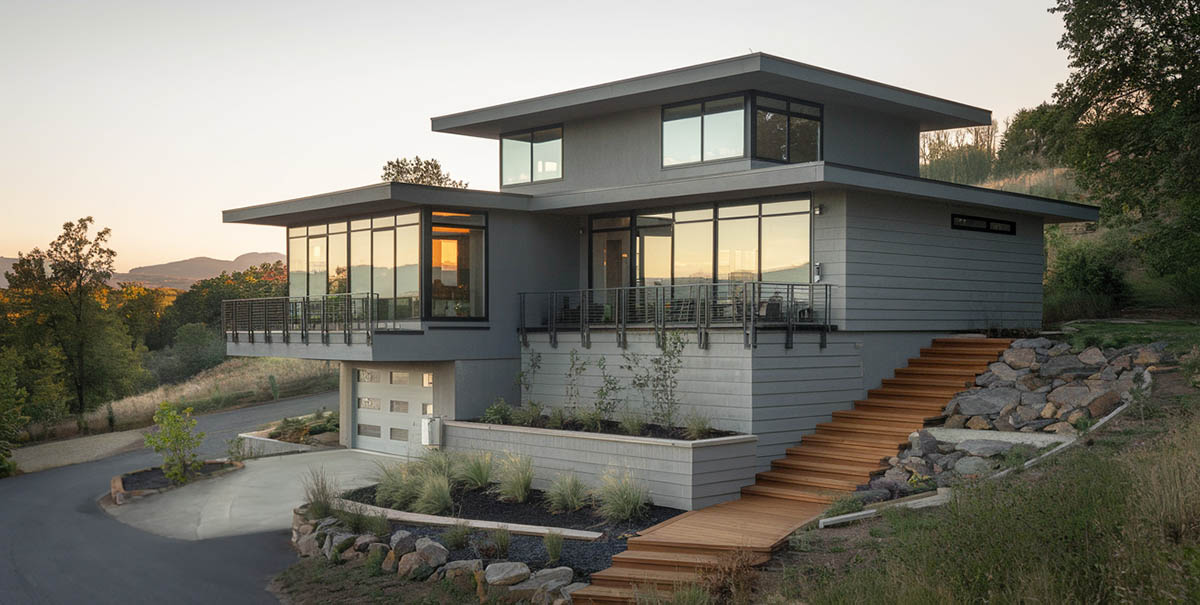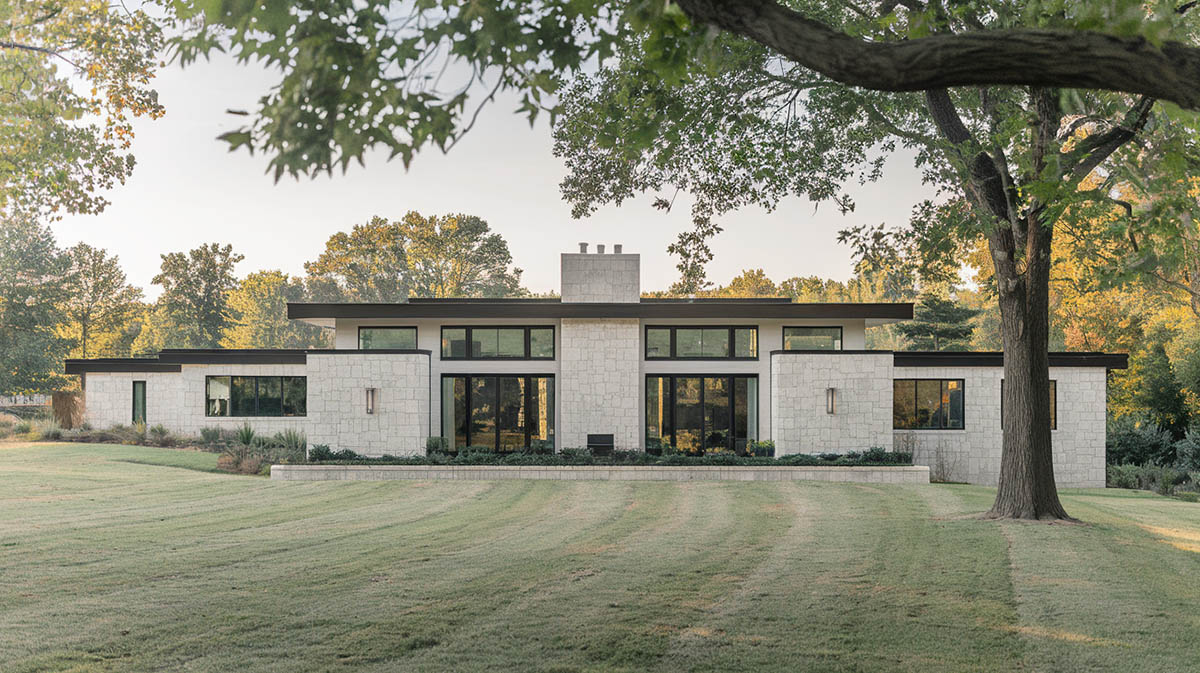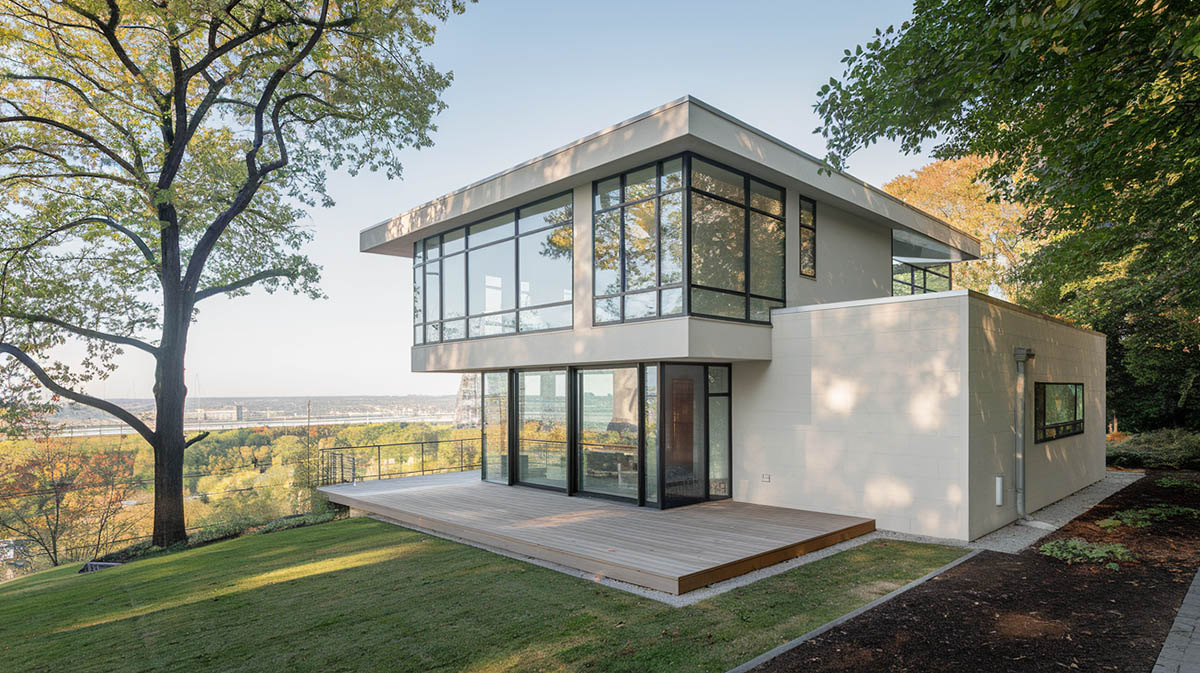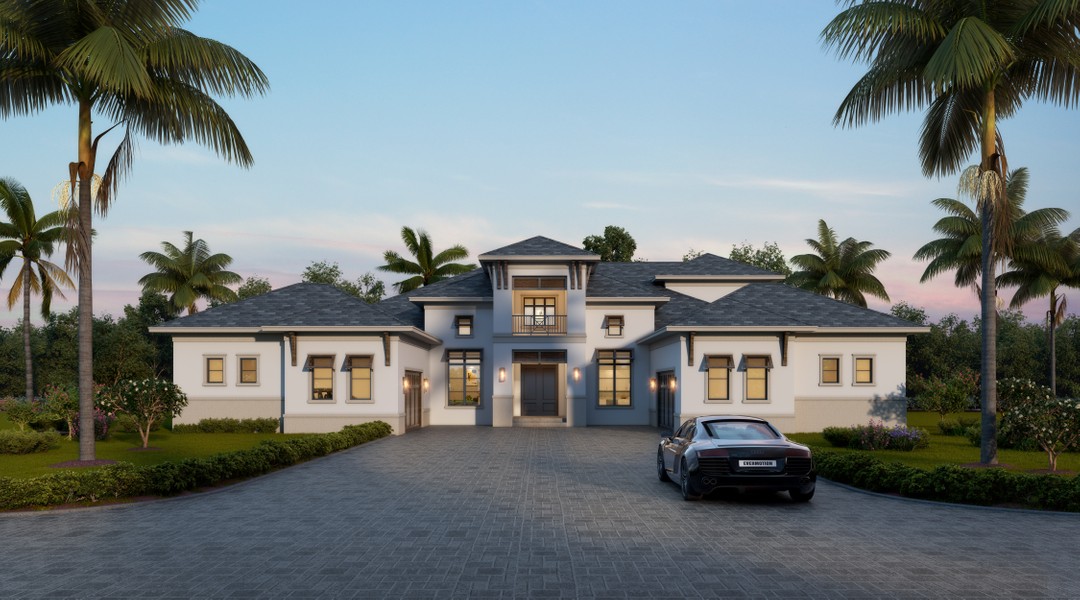9 Advantages of Building Houses with Concrete Masonry Units (CMUs)

Concrete masonry units (CMUs), known to most as concrete blocks, have tremendously impacted home building since their creation in 1900. That year, Harmon S. Palmer introduced the first commercially viable concrete block machine, sparking a revolution in construction. This innovation provided builders with a standardized, efficient alternative to traditional brick and stone. Following WWII’s building boom, concrete blocks soared in popularity. Let explore the top 9 advantages of building houses with concrete masonry units or CMUs.
CMU manufacturing and building techniques have progressed immensely since those early hollow blocks. Today’s CMU house plans and construction practices incorporate advanced material science – special aggregates, reinforced polymers, supplementary cements – boosting their versatility and performance. They are crafted into diverse dimensions and forms, with specialized units designed for particular applications.
In modern residential construction, CMUs are extensively utilized across single-family dwellings and multi-unit buildings alike. They compose foundation and above-grade walls, partition walls, and decorative facets. Innovative applications also include sound barriers, retaining walls, and energy-efficient building envelopes. Insulated CMUs (ICMUs) and textured blocks provide enhanced thermal performance and curb appeal.
The prevalence of CMUs in homes today highlights their inherent assets. In disaster-prone regions, CMU buildings better withstand hurricanes, tornadoes, and other extreme weather. With sustainability as a priority, their thermal mass, efficiency, and longevity are advantages. Coastal and disaster-susceptible areas display climbing CMU usage, buoyed by continuous advances in concrete technology. The blocks available now are stronger, lighter, and greener than before.
What drives the residential sector’s fervent adoption of CMU construction? For starters, rising desire for durable, low-maintenance houses. Additionally, growing ecological awareness and focus on energy-efficiency and resilience. Furthermore, innovations in manufacturing and building methods. And finally, architectural trends extolling concrete masonry’s aesthetic potential.
Structural Advantages
As one of the most resilient modern building materials, CMUs bring decades of reliable performance to projects. Their dense composition and sheer mass provide unique benefits that lighter materials simply cannot match.
CMU walls and foundations withstand the elements incredibly well. Properly reinforced CMU structures have withstood over 150mph winds during hurricanes with minimal damage. Meanwhile, devastating tornadoes have left these types of buildings standing after leveling surrounding wood-frame construction. CMUs resist not just wind and weather but also physical impacts, temperature swings, water damage, rot, and pests. They require little maintenance over many years of use.
The innate stability and sheer load-bearing strength of CMUs excel in multi-story buildings. Their typical compressive strength ranges from 1900-3000 psi, easily supporting heavy roofing systems and upper floors. CMU foundations offer impressive stability thanks to high compressive strength, shifting resistance, and hydrostatic pressure protection. Vertically, these buildings reliably withstand years of sustained roof/floor loads with minimal deflection. Laterally, their shear walls distribute intense seismic and wind forces more evenly than other materials.
Reinforcement of CMU structures is readily accomplished with rebar, bond beams, grouting, steel frames, and post-tensioning. This reinforcement flexibility allows CMU construction to meet diverse structural requirements. Homeowners in tornado alleys, builders in seismic zones, and developers seeking decades of low-maintenance operation all value the structural reliability unique to concrete masonry units. Simply put, CMUs bring building owners peace of mind that their investment will stand the test of time.

Environmental Benefits
Concrete masonry units (CMUs) offer invaluable environmental advantages as a building material. Their substantial thermal mass absorbs heat during the day and releases it at night, reducing temperature swings. This thermal regulation creates stable indoor temps and cuts HVAC costs by 20-30%. Recycled materials also bolster CMU sustainability. Production uses recycled aggregate and industrial byproducts like fly ash and slag cement. Local sourcing further shrinks the carbon footprint by minimizing transport.
Overall, CMU construction promotes energy efficiency today and tomorrow through passive solar design. The thick CMU walls delay heat transfer and manage gains, decreasing reliance on mechanical systems. This thermal lag maintains comfortable temps while shrinking equipment size and maintenance needs. Optimized HVAC translates into superior indoor air quality and humidity control.
CMUs also align with green building goals thanks to recycled content, local sourcing, carbon uptake, and low waste. With standardized sizing and recyclable components, CMU construction generates little landfill waste relative to alternatives. Plus, the long service life reduces replacement demands over decades of use.
In essence, CMUs checked all the boxes for sustainable architecture from manufacturing to end-of-life. The environmentally conscious properties lead to certifications for green building programs using energy-efficient, climate-responsive design. By merging energy efficiency and sustainability, CMU construction delivers immediate and lastingplanet-friendly performance. The ecological benefits will only grow in importance for future-focused development.
Cost Benefits
When it comes to construction, concrete masonry units (CMUs) offer both immediate and long-lasting financial benefits compared to other building materials. Though upfront costs may differ depending on the project, CMUs provide savings during the actual construction process and over the lifetime of the structure.
CMUs streamline work on site thanks to straightforward installation, reduced crew and equipment needs, and construction timeline efficiencies. Bulk purchasing options, decreased waste and storage requirements, and lower replacement rates save on materials. CMU structures also facilitate labor cost reductions since they utilize basic masonry skills, allow faster training, require less supervision, and enable parallel foundation and wall work. Timeline advantages include weather resilience, fewer delivery issues, quicker completion and simpler inspection processes.
Yet the real value lies in long-term savings spanning decades. Property insurance often costs less for CMU buildings due to exceptional fire resistance and performance during storms. Reduced cooling and heating expenses provide 20-30% in annual energy savings. With minimal maintenance needs, repair costs also plummet over time. Moreover, CMU construction boosts resale value, lending appeal, and appraisal outcomes.
In essence, though CMU expenses fluctuate initially depending on the scale and details of individual projects, these sturdy structures pay dividends over years of ownership through decreased operating and replacement budgets and better building valuation. CMUs uniquely cater to budget-conscious owners, commercial developers, long-term investors, and all interested in optimizing construction and operational costs over the building’s lifetime.

Safety Features
CMU construction offers exceptional fire protection and resistance to adverse weather conditions, making it an optimal building material for the safety-minded. CMU walls provide superior fire resistance and containment capabilities. The noncombustible concrete blocks have a zero flame spread rating and maintain structural integrity even when exposed to extreme heat over 2,000°F. Standard 8-inch CMU walls deliver up to 4 hours of fire resistance without additional treatment. By effectively compartmentalizing fires and preventing flame spread to other areas, CMU construction protects evacuation routes and preserves critical building systems. These inherent fire-safety advantages translate to reduced property insurance premiums and enhanced coverage options.
CMU buildings also demonstrate unmatched durability during severe weather events like hurricanes, tornadoes and flooding. The heavy mass and strength of concrete block walls resist high winds exceeding 150 mph, pressure changes, and even debris impact while minimizing structural failure and damage. CMU construction maintains flood resilience by avoiding water damage or mold growth.
The robust CMU safety features provide multifaceted benefits – increased occupant protection, lower emergency response requirements, improved business continuity and faster recovery after disasters. CMU construction is ideal for residential storm shelters, critical facilities, coastal sites, high-wind zones and flood-prone areas. Specifying CMU walls delivers comprehensive hazard protection and peace of mind that the structure can withstand both natural and man-made threats.
Comfort and Living Benefits
Concrete masonry unit (CMU) construction offers exceptional comfort and living benefits that enhance indoor environments. CMU walls provide superior acoustic performance with high Sound Transmission Class ratings, reducing noise transfer between rooms and outside. The high thermal mass regulates temperatures beautifully – minimizing fluctuations and preventing hot/cold spots for consistent comfort without constantly running HVAC. CMUs naturally control humidity as well, preventing mold growth and stuffy air.
The sturdy nature of CMU allows flexible open floor plans suited for both contemporary and traditional designs, while supporting large windows and modifications. Rooms feel comfortable year-round with reduced drafts and even temperatures from corner to corner. Wall density also minimizes vibrations and mechanical noise for peaceful quiet zones. What’s more, CMUs reduce allergens and filter indoor pollutants for fresher, healthier air.
Overall, CMU structures create living spaces perfect for light sleepers, allergy sufferers, remote workers, and families on different schedules. The acoustic isolation, thermal stability, humidity control, and air purity provide profound lifestyle benefits:
- Enhanced concentration and productivity
- Improved sleep quality
- Reduced stress
- Better health outcomes
- Increased home enjoyment
By regulating temperature, filtering air, and separating noise, CMU walls deliver complete comfort and environmental quality to protect and satisfy occupants. The natural performance attributes ultimately create dream environments tailored to modern living needs.

Maintenance Advantages
CMU construction offers substantial long-term maintenance benefits for buildings, both inside and out.Externally, CMU walls require very little upkeep. Their weather-resistant properties provide durability, eliminating the need for routine structural maintenance. CMU exteriors resist moisture penetration, perform well through freeze-thaw cycles, and avoid material degradation from sun exposure. Simple pressure washing cleans the surface. Paint and coatings also last over 15 years on properly prepared CMU. The material deters pest infestations, with no food source for insects and prevention of rodent penetration.
Internally, CMU walls maintain stability over time. They resist settling and shrinkage cracks. Their fastener holding capability is superior to other materials. CMU construction also excels at moisture control. It prevents water penetration and manages humidity effectively. The inorganic material is mold resistant as well. CMU surfaces stand up to daily wear and tear, enhancing aesthetic preservation.
These low-maintenance qualities provide extensive benefits. Property investors save on long-term ownership costs. Building managers reduce maintenance staffing needs. Homeowners plan for lengthy occupancy with fewer repairs. Facilities with tight budgets minimize expenses. Harsh environments see enhanced durability. CMU construction means lower costs, better performance, and higher property values through dramatically reduced maintenance requirements.
Design Flexibility
CMUs offer remarkable design versatility for all types of construction. Whether you’re an architect conceptualizing a sculptural facade, a developer looking to make your new condos stand out, or a homeowner wanting to add visual interest to your property, CMUs provide extensive aesthetic and structural options to bring creative visions to life.
CMUs come in a diverse range of sizes, shapes and textures to meet specific design needs. Standard blocks in dimensions like 8″ x 8″ x 16″ can be combined with specialty pieces like curved units, bull-nose edges, and half blocks for detail work. Custom shapes and sizes are also possible for truly distinctive projects. Various face finishes like split, ground and glazed surfaces add textural interest, resembling natural stone, smooth concrete or terra cotta. Integral colors throughout the blocks provide color stability over time, with possibilities for gradient blends, earth tones to bold hues. Special surface treatments like exposed aggregate, sandblasting and etching create even more visual depth.
The structural capabilities of CMUs are equally impressive, enabling the construction of load-bearing walls, long spans with reinforcement, complex angles and curves. This makes it possible to implement open floor plans, unusual roof designs, and details like cantilevers. CMUs also work beautifully with complementary materials like stone, glass block, metal panels, wood and brick. In short, CMUs offer extensive aesthetic choices to create unique architectural statements, adapt to diverse styles, and meet specialized design goals.
Construction Benefits
Constructing with concrete masonry units (CMUs) streamlines projects through simplified building processes, abundant skilled labor, and resistance to weather delays. CMU construction shines thanks to straightforward installation. Masons follow standardized techniques to rapidly assemble interlocking blocks into walls with minimized equipment, quality checks, and coordination between trades. Wall sections go up rapidly once foundations are prepped, simultaneously across sites. CMU curing even accelerates compared to poured concrete. This efficiency resists weather delays that plague other methods. CMUs withstand rain, temperature swings and other conditions that stall projects. Construction continues year-round with fewer stoppages.
These same advantages also attract consistent, quality labor across sites. Well-defined training and certification programs supply skilled masons versed in CMU best practices. Their uniform techniques ensure reliable wall construction meeting industry standards. With fewer specialized trades to manage on site, CMU contractors better coordinate crews. CMU construction also boosts safety by minimizing accidents. Installation from stable platforms reduces falls and consistent block handling limits material risks.
Future Benefits
Superior Resale Value – CMU homes retain exceptional resale value due to their structural integrity and durability. They appreciate at higher rates than frame homes, especially in severe weather regions. CMU construction has demonstrated sustained market value for decades. This reliability also inspires buyer confidence and enhances marketability.
Adaptability for Renovations – These buildings enable flexible interior renovations by effortlessly supporting structural changes to layouts and utilities. Their sturdy foundation facilitates potential vertical expansions or horizontal additions. CMU walls also readily accommodate technology upgrades and contemporary amenities like appliances and smart home systems.
Energy Efficiency – CMU’s energy efficiency significantly impacts value. Buyers emphasize utility expenses, so CMU homes’ lower costs and higher energy ratings attract interest. CMU buildings also align well with future regulations.
Insurance Savings – The disaster resistance and reduced claims history of CMU buildings provide insurance advantages. Owners benefit from lower premiums and enhanced coverage options.
In summary, CMU construction offers critical future-proofing qualities – sustained property value, adaptable spaces, energy savings, and insurance perks. These long-view traits make CMU buildings appealing assets for property investors, developers, managers, and homeowners planning renovations or additions. By mitigating obsolescence risks, CMUs deliver reliable, flexible and cost-effective structures with exceptional resale value potential.
